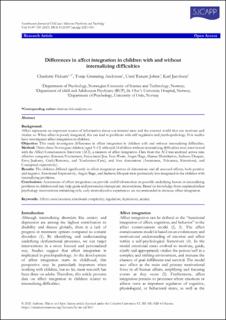| dc.description.abstract | Background: Affect represents an important source of information about our internal state and the external world that can motivate and vitalize us. When affect is poorly integrated, this can lead to problems with self-regulation and psychopathology. Few studies have investigated affect integration in children. Objective: This study investigates differences in affect integration in children with and without internalizing difficulties. Method: Thirty-three Norwegian children (aged 9–13) with and 24 children without internalizing difficulties were interviewed with the Affect Consciousness Interview (ACI), a measure of affect integration. Data from the ACI was analyzed across nine affective categories (Interest/Excitement, Enjoyment/Joy, Fear/Panic, Anger/Rage, Shame/Humiliation, Sadness/Despair, Envy/Jealousy, Guilt/Remorse, and Tenderness/Care), and four dimensions (Awareness, Tolerance, Emotional, and Conceptual expressivity). Results: The children differed significantly in affect integration across all dimensions and all assessed affects, both positive and negative. Emotional Expressivity, Anger/Rage, and Sadness/Despair were particularly less integrated in the children with internalizing problems. Conclusions: Assessment of affect integration can provide useful information on possible underlying factors in internalizing problems in children and may help guide and personalize therapeutic interventions. Based on knowledge from empirical infant psychology interventions mimicking rich, early intersubjective experiences are recommended to increase affect integration. | en_US |

